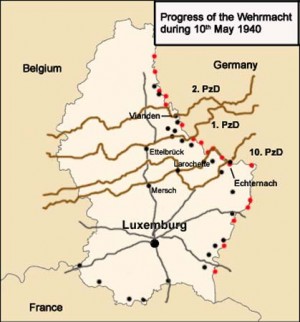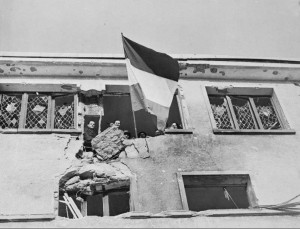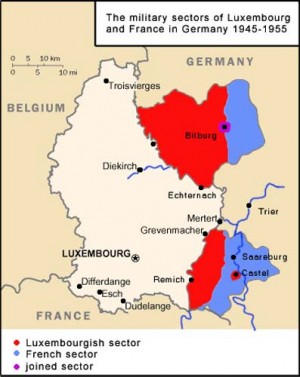 The German occupation of Luxembourg in World War II lasted for a period of four years. It began on May 10, 1940, when Wehrmacht units invaded in order to secure the transit of German forces about to attack France. On the same day, the Netherlands and Belgium were also invaded, allowing the Germans to avoid a direct assault on the Maginot Line. Adolf Hitler had considered attacking Luxembourg as early as October 1939, but the date had been repeatedly pushed back. The country was liberated by the Allies in September of 1944.
The German occupation of Luxembourg in World War II lasted for a period of four years. It began on May 10, 1940, when Wehrmacht units invaded in order to secure the transit of German forces about to attack France. On the same day, the Netherlands and Belgium were also invaded, allowing the Germans to avoid a direct assault on the Maginot Line. Adolf Hitler had considered attacking Luxembourg as early as October 1939, but the date had been repeatedly pushed back. The country was liberated by the Allies in September of 1944.
Background
When Germany invaded Poland on September 1, 1939, the government of Luxembourg was faced with a difficult decision. Despite the population’s sympathy with the Allied side, the country maintained its long-standing neutrality, confining itself to erecting defenses along its German and French frontiers. These consisted largely of concrete blocks, and it was clear that the powerful German army would have little trouble in breaking down the fortifications if war did come.
Tensions grew after Germany halted exports of coke for Luxembourg’s steel industry in spring of 1940, and in the early hours of May 10, the borders were closed. Undercover German agents in Luxembourg had limited success in sabotaging defenses and communications. The invasion itself was, predictably, almost a walkover. Although some of Luxembourg’s police force did resist, almost the entire nation had been occupied by nightfall. The royal family and government were evacuated, eventually settling in Canada for the duration of the war.
Luxembourg Under German Rule
In World War I, Luxembourg had managed to reach an accommodation with the occupying Germans, and many people at first believed that this would once again be the case. The Nazis, however, treated Luxembourg as a territory of the German Reich, and its people as no more than a regional ethnic group. On May 17, Damian Kratzenberg’s Volksdeutsche Bewegung was founded in the capital, with the aim of using propaganda to persuade the population to see Germany as its natural ruler.
At the beginning of August, the initial military administration of Luxembourg was replaced by a civil administration, headed by Gustav Simon, who already held a similar role in the Gaue Trier-Koblenz region of Germany itself. His Heim ins Reich propaganda campaign, which was later expanded to include the use of terror tactics including arbitrary arrest and torture, aimed to push the Luxembourgish people into believing that, being ethnically German, their natural home was as a part of the Third Reich.
Goals of the Occupation
Simon, as a Gauleiter, reported directly to Hitler, and was given two aims. The first was the complete Germanization of the country, with the utter removal of anything that had French associations—even something as simple as the wearing of berets or the use of French greetings. Related to this was his second goal, which was to be the complete extinction of the state of Luxembourg itself; the country was to be reduced to nothing more than an integral part of Germany.
In the fall and winter of 1940, German laws were progressively introduced, including the Nuremberg Laws which provided for the persecution of Jews. Those Luxembourgers who were known to be opposed to Nazi rule were fired from their jobs and deported east, sometimes to remote parts of Germany and, in extreme cases, to concentration camps. Civil organizations such as labor unions and political parties were forcibly dissolved, and press censorship introduced.
Jews in Occupied Luxembourg
 In 1939, the Jewish population of Luxembourg was a little under 4,000, with a substantial number of these having fled Germany. Just under half this number remained in May 1940. With the enforcement of the Nuremberg Laws, Jews were banned from public buildings and had their assets confiscated; they were also fired from their jobs. More than 600 Jews were deported to Spain and France but, as neither country would accept them, they were forced to wander Europe.
In 1939, the Jewish population of Luxembourg was a little under 4,000, with a substantial number of these having fled Germany. Just under half this number remained in May 1940. With the enforcement of the Nuremberg Laws, Jews were banned from public buildings and had their assets confiscated; they were also fired from their jobs. More than 600 Jews were deported to Spain and France but, as neither country would accept them, they were forced to wander Europe.
Jews were subjected to curfews in August of 1941, while synagogues were demolished. Between October of that year and June of 1942, the remaining few hundred Jews in Luxembourg were transported to a variety of death camps, including Belsen, Sobibor, and Auschwitz. Almost 700 people were deported in this way, of which fewer than 50 survived the war. In June of 1943, Luxembourg was declared “Judenfrei”—meaning cleared of Jews—by Simon, to Hitler’s considerable satisfaction.
Life for Non-Jewish Luxembourgers
With the government and royal family abroad, there was no obvious focal point for Luxembourgers’ patriotic sentiments, and many people simply resolved to go about their daily lives as best they could, quietly hoping that they would one day be liberated. The resistance in Luxembourg was small and often ineffective owing to clashes between the ideologies of its various components. The most visible aspect of Luxembourgish resistance was a short-lived general strike in August of 1942, which was brutally suppressed by the Nazis.
The resistance groups did not formally combine until spring 1944, with many people joining the far larger French Resistance instead. Acts of defiance were mostly psychological, such as placing patriotic and anti-German graffiti, and a number of Jews were hidden by communists and members of the clergy. On the contrary, there were some Luxembourgish collaborators who were active within the Volksdeutsche Bewegung. It is generally accepted that their numbers were similar to those in the ranks of the resistance.
Liberation and Aftermath
 Luxembourg City was liberated by the Allies without a fight on September 10, 1944. The only significant attempt to retake a town in the country came in November, when Waffen-SS soldiers failed to capture Vianden. Northern Luxembourg was struck by artillery bombardments during the Battle of the Bulge the following month, but the Germans were unable to capture any significant territory in the country as Germany itself was now under attack by the Allies.
Luxembourg City was liberated by the Allies without a fight on September 10, 1944. The only significant attempt to retake a town in the country came in November, when Waffen-SS soldiers failed to capture Vianden. Northern Luxembourg was struck by artillery bombardments during the Battle of the Bulge the following month, but the Germans were unable to capture any significant territory in the country as Germany itself was now under attack by the Allies.
After the war, a number of Luxembourgish troops assisted the French in the occupation of Germany, a role they were to play for around a decade. About 2,000 collaborators were convicted as traitors. Nine were sentenced to death, while most of the rest were imprisoned until a general amnesty in the 1950s. Luxembourg lost about 5,700 citizens during its occupation, corresponding to a little less than two percent of the population.